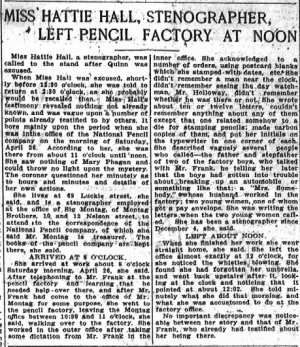 Another in our series of new transcriptions of contemporary articles on the Leo Frank case.
Another in our series of new transcriptions of contemporary articles on the Leo Frank case.
Atlanta Journal
Thursday, May 8th, 1913
Miss Hattie Hall, a stenographer, was called to the stand after Quinn was excused.
When Miss Hall was excused, shortly before 12:30 o’clock, she was told to return at 2:30 o’clock, as she probably would be recalled then. Miss Hall’s testimony revealed nothing not already known, and was vague upon a number of points already testified to by others. It bore mainly upon the period when she was in the office of the National Pencil company on the morning of Saturday, April 26. According to her, she was there from about 11 o’clock until noon. She saw nothing of Mary Phagan and could throw no light upon the mystery. The coroner questioned her minutely as to hours and minutes and details of her own actions.
She lives at 69 Luckle street, she said, and is a stenographer employed at the office of Big Montag, of Montag Brothers, 10 and 12 Nelson street, to attend to the correspondence of the National Pencil company, of which she said Mr. Montag is treasurer. The books of the pencil company are kept there, she said.
ARRIVED AT 8 O’CLOCK.
She arrived at work about 8 o’clock Saturday morning, April 26, she said. After telephoning to Mr. Frank at the pencil factory and learning that he needed help over there, and after Mr. Frank had come to the office of Mr. Montag for some purpose, she went to the pencil factory, leaving the Montag office between 10:30 and 11 o’clock, she said, walking over to the factory. She worked in the outer office after taking some dictation from Mr. Frank in the inner office. She acknowledged to a number of orders, using postcard blanks which she stamped with dates, etc. She didn’t remember a man near the clock, didn’t remember seeing the day watchman, Mr. Holloway, didn’t remember whether he was there or not. She wrote about ten or twelve letters, couldn’t remember anything about any of them except that one related somehow to a die for stamping pencils; made carbon copies of them, and put her initials on the typewriter in one corner of each. She described vaguely several people who called—the father and stepfather of two of the factory boys, who talked with Mr. Frank, he telling her later that the boys had gotten into trouble about breaking up an automobile or something like that; a “Mrs. Somebody,” whose husband worked in the factory; two young women, one of whom got a pay envelope. She was writing the letters when the two young women called. She has been a stenographer since December 4, she said.
LEFT ABOUT NOON.
When she finished her work she went straight home, she said. She left the office almost exactly at 12 o’clock, for she noticed the whistles blowing. She found she had forgotten her umbrella, and went back upstairs after it, looking at the clock and noticing that it pointed at about 12:02. She told minutely what she did that morning, and what she was accustomed to do at the factory office.
No important discrepancy was noticeable between her story and that of Mr. Frank, who already had testified about her being there.
* * *
Atlanta Journal, May 8th 1913, “Miss Hattie Hall, Stenographer, Left Factory at Noon,” Leo Frank case newspaper article series (Original PDF)
